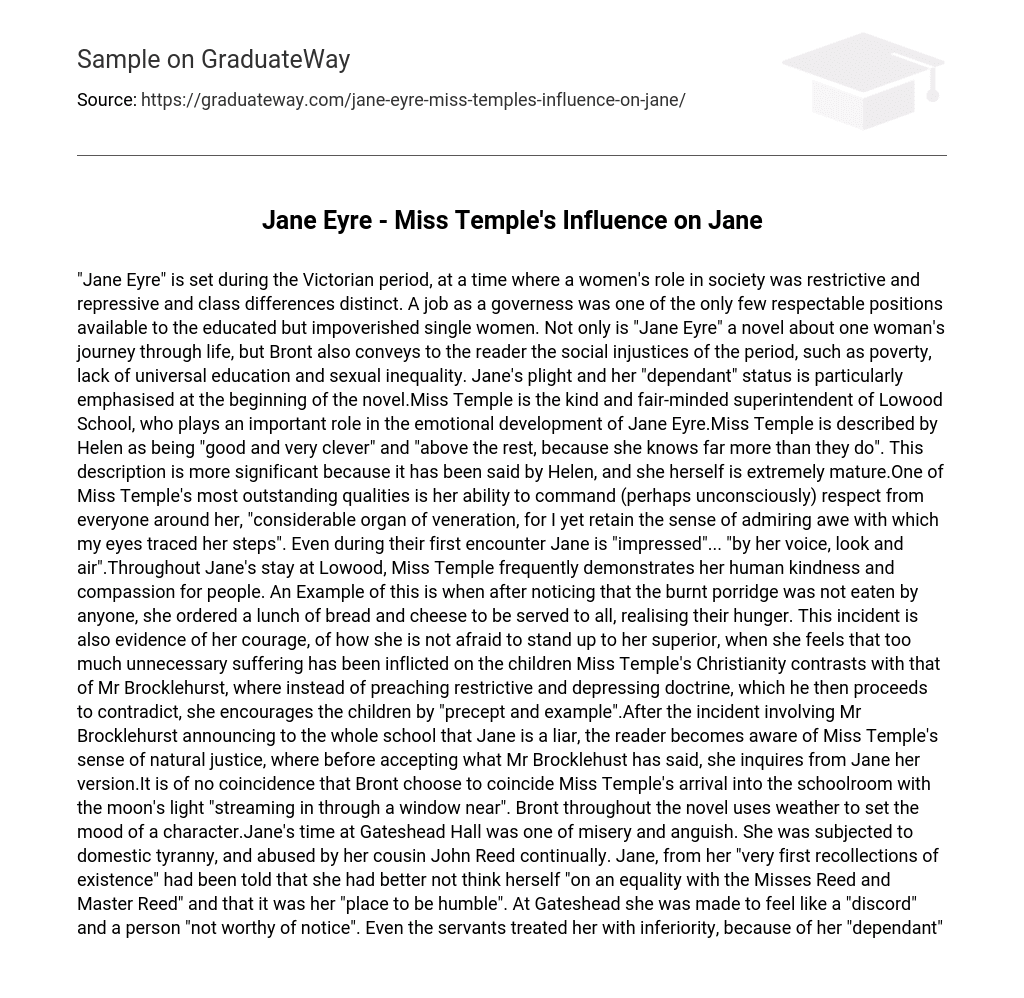“Jane Eyre” takes place in the Victorian era, a time characterized by societal restrictions, oppressive gender roles, and clear class distinctions. During this period, one of the few socially accepted occupations for educated yet financially struggling women was that of a governess.
The novel “Jane Eyre” not only follows one woman’s life journey, but it also highlights the social injustices of the time period, including poverty, lack of education, and gender inequality. The beginning of the novel emphasizes Jane’s struggles and her dependent status. Miss Temple, the superintendent of Lowood School, plays a crucial role in Jane’s emotional growth. Described by Helen as kind and intelligent, Miss Temple stands out among her peers due to her extensive knowledge. Helen’s mature perspective adds significance to this description. One remarkable quality of Miss Temple is her ability to command respect from those around her, even unconsciously. Jane is immediately impressed by her during their first encounter.
Throughout Jane’s time at Lowood, Miss Temple consistently demonstrates her kindness and compassion towards others. An example of this is when she noticed that nobody had eaten the burnt porridge and promptly ordered a lunch of bread and cheese to be served to all to alleviate their hunger. This incident also showcases her bravery as she is not afraid to stand up to her superiors when she believes that the children are being subjected to unnecessary suffering. In contrast to Mr. Brocklehurst’s restrictive and gloomy religious teachings, Miss Temple promotes and encourages the children through both her words and actions. After Jane is publicly labeled a liar by Mr. Brocklehurst, Miss Temple displays her sense of fairness by seeking Jane’s side of the story before accepting what has been said. It is not a coincidence that Bronte chooses to introduce Miss Temple into the schoolroom during the moonlit evening, as Bronte frequently uses weather descriptions to convey the mood of a character. Jane’s time at Gateshead Hall was filled with unhappiness and torment.
Jane experienced domestic oppression and constant mistreatment from her cousin John Reed. Since her earliest memories, she was consistently reminded that she should not consider herself equal to the Misses Reed and Master Reed, but instead should remain humble. At Gateshead, she felt like an outcast and unworthy of attention, even from the servants who treated her as inferior due to her dependent status, which was perceived without any sympathy in Victorian society. Her yearning to give and receive love remained unfulfilled in this environment.
At Lowood, Jane experienced respect and equality from Miss Temple, who fulfilled her desire for love and care. Initially arriving at Lowood as an angry young girl, Jane’s resentment towards her aunt and cousins subsided thanks to the influence of Helen Burns and Miss Temple. These role models taught her to control her emotions and find happiness. Jane acknowledges that her accomplishments were largely due to Helen’s instruction, and she considers Helen to be a substitute for a mother, governess, and companion. Jane also admires Miss Temple’s treatment of Helen and often imitates her behavior.
Miss Temple is a role model to Jane, demonstrating the importance of kindness and respect when interacting with others. During a tea invitation, Jane watches Helen and Miss Temple engage in an intellectually stimulating conversation, witnessing the genuine connection between them. Recognizing their intelligence and well-read nature, Jane admires these qualities and strives to cultivate them for herself, as they lead to an independent mindset that she desires. Jane’s transformation after Miss Temple’s departure is evident, as she loses her settled feelings and tranquility without her presence. Miss Temple’s influence shapes Jane’s character, instilling in her the values of kindness, empathy for others’ suffering, and a steadfast commitment to justice. Jane credits Miss Temple for providing her with traits and habits that prove beneficial in future situations, such as leaving Gateshead and rejecting a marriage proposal from St John.





